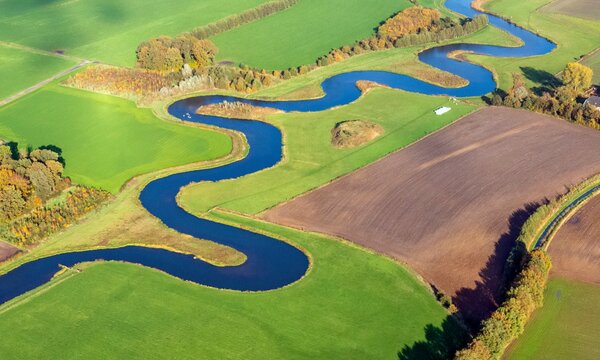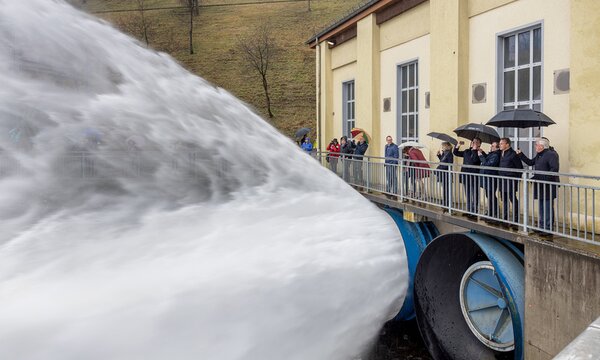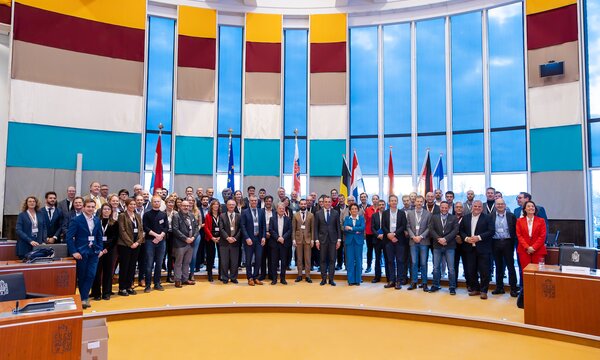In an era where climate extremes present significant challenges, collaborative research efforts are increasingly important. One such initiative is the JCAR ATRACE programme, which brings together knowledge institutes and local governmental entities from multiple countries. This collaboration has facilitated research on climate risks, drawing on a diverse range of expertise.
Among those contributing to this important research were three dedicated Master’s students: Ivan Leegwater, William Cazemier, and Sander de Groot from the University of Twente. They got to experience the collaborative nature of JCAR ATRACE by working together: each exploring on a different research question focused on the Vecht river basin. We spoke to them to find out more about their research and experience.
The unique aspects of the JCAR ATRACE programme
Ivan explains, "Graduating within the JCAR ATRACE programme was a truly unique experience. Working alongside two fellow students from the University of Twente, we all focused on the same river basin —the Overijsselse Vecht. This simultaneous approach allowed us to collaborate intensively, pooling our resources and time to dive deeper into the area's distinctive characteristics.”.
He shares that the programme provided a dynamic platform for knowledge exchange that extended beyond our university. They got to engage not only with students from other institutions but also with researchers and policymakers from organisations like Deltares and government bodies such as Waterschap Drents Overijsselse Delta and Waterschap Vechtstromen. “These regular interactions enriched our perspectives, ensuring that our research was both relevant and informed by the latest knowledge.” Ultimately, the experience emphasised collective achievement and real-world impact, making the journey to graduation both professionally and personally rewarding.
William adds that unlike traditional master's programmes where students typically work individually, the JCAR ATRACE programme fosters collaboration among researchers. All research topics are interconnected, contributing to the overarching goals of JCAR ATRACE, which is quite unique. For instance, in this case all three students conducted their research in the same study area: “This not only made the process more efficient but also more enjoyable, as we didn’t have to handle everything alone. Additionally, it was fascinating to learn about the diverse research being conducted in other transboundary catchments across the Netherlands, which provided valuable insights.”
For Sanders, the unique aspect of our programme is the work between knowledge institutes from multiple countries and local governmental institutions. Conducting research on such a large-scale regarding climate risks is special, as it draws from a vast pool of combined expertise. “Being part of the early stages of the JCAR programme has been a unique opportunity, and I am excited to see what further accomplishments lie ahead."
Their research
The effects of nature-based solutions on high- and low flows in the Vecht river basin
Ivan shares that climate change is intensifying extreme weather events, disrupting water systems and causing economic losses. Nature-based solutions (NBS) provide a sustainable alternative to traditional infrastructure. His study assessed the impact of NBS on high and low flows in the Vecht catchment using the LISFLOOD-OS hydrological model. It found that afforestation significantly reduced peak flows in summer through enhanced infiltration and interception; however, its effectiveness relies on large-scale implementation, with current policies only aiming for a 10% increase in forest cover. Soil improvement measures like aeration and conservation tillage mitigated surface runoff during heavy rainfall and are more feasible due to farmland availability. Yet, both approaches had minimal effects on low flows and drought resilience. Future research should improve NBS parameterisation and link with groundwater models to better evaluate long-term impacts on water availability. Ivan concludes that “a better understanding of NBS impacts will support effective implementation and improve integrated water management”.
Discover Ivan’s research thesis here.
The effects of nature-based solutions on high and low flows in the Vecht using hydrological model Wflow sbm
William studied how nature-based solutions (NBS) can influence extreme water levels in the Vecht River, both high and low, using a hydrological model called Wflow_sbm. He tested over ten different NBS and found that planting forests (afforestation) and creating wetlands had the most significant impact. “These measures successfully reduced peak river flows during heavy rainfall, but they had little effect on maintaining water levels during dry periods.”
However, for these solutions to effectively reduce peak flows, they need to be implemented on a large scale—specifically, converting 25% of the entire catchment area into forest. Additionally, these measures change how water moves through the landscape. Because trees and wetlands increase evaporation, less water ultimately flows into the river, which affects overall water availability.
Discover William’s research thesis here.
Evaluation of ensemble flood forecast performance by using a semi-distributed multimodel approach compared to single models
Sander's research focused on the effects of using multiple hydrological models in a flood forecasting system for the Vecht River. He shares that typically, a single hydrological model is used in a flood forecasting system to predict river discharge based on weather forecasts. However, different models can behave differently, meaning that relying on just one model could introduce significant uncertainty due to the model's structure. By combining forecasts from multiple models, model uncertainty can be reduced and forecast performance can improve.
"I designed a forecasting system using the HBV and GR4H hydrological models, with an hourly time step, for the Vecht and its tributaries. I calibrated and validated the models and used the high-flow event of December 2023 to evaluate the forecast performance of the models individually, as well as combined in a multi-model system.”
Discover Sander’s research thesis here.
Ivan, William, and Sander’s work emphasises the value of integrating academic research with local and governmental initiatives to tackle these complex issues.
As the JCAR ATRACE programme develops, the contributions of these students highlight the potential for positive change through teamwork across different regions. Their journey reflects the importance of education and research in enhancing our understanding of climate risks and encourages future generations to participate in efforts to protect our planet.



